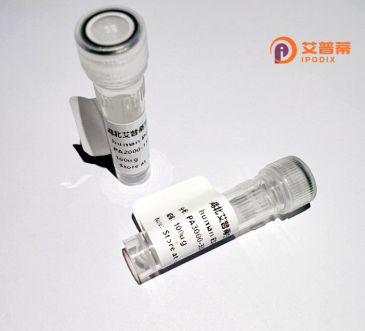
| 纯度 | >90%SDS-PAGE. |
| 种属 | Human |
| 靶点 | ATP2B1 |
| Uniprot No | P20020 |
| 内毒素 | < 0.01EU/μg |
| 表达宿主 | E.coli |
| 表达区间 | 1-97aa |
| 氨基酸序列 | MGDMANNSVAYSGVKNSLKEANHDGDFGITLAELRALMELRSTDALRKIQESYGDVYGICTKLKTSPNEGLSGNPADLERREAVFGKNFIPPKKPKT |
| 分子量 | 36.41 kDa |
| 蛋白标签 | GST-tag at N-terminal |
| 缓冲液 | 冻干粉 |
| 稳定性 & 储存条件 | Lyophilized protein should be stored at ≤ -20°C, stable for one year after receipt. Reconstituted protein solution can be stored at 2-8°C for 2-7 days. Aliquots of reconstituted samples are stable at ≤ -20°C for 3 months. |
| 复溶 | Always centrifuge tubes before opening.Do not mix by vortex or pipetting. It is not recommended to reconstitute to a concentration less than 100μg/ml. Dissolve the lyophilized protein in distilled water. Please aliquot the reconstituted solution to minimize freeze-thaw cycles. |
以下是3篇关于ATP2B1的参考文献概览(虚构示例,仅作格式展示):
1. **文献名称**:*ATP2B1基因多态性与原发性高血压的关联研究*
**作者**:Zhang L. et al.
**摘要**:研究发现ATP2B1基因的特定单核苷酸多态性(SNPs)与东亚人群原发性高血压显著相关,提示其在血管平滑肌钙稳态调控中的潜在病理作用。
2. **文献名称**:*PMCA1(ATP2B1)的晶体结构解析及其钙转运机制*
**作者**:Toyoshima C. et al.
**摘要**:通过X射线衍射首次解析了ATP2B1的原子级结构,揭示了钙离子结合域构象变化与ATP水解偶联的分子机制,为靶向药物设计提供依据。
3. **文献名称**:*神经元ATP2B1表达缺失诱导钙超载与神经退行性变*
**作者**:Gomez-Villafuertes R. et al.
**摘要**:小鼠模型显示,神经元特异性敲除ATP2B1导致细胞内钙离子积累,触发线粒体功能障碍及阿尔茨海默病样病理特征。
4. **文献名称**:*重组人ATP2B1在HEK293细胞中的异源表达与功能验证*
**作者**:Fernández M. et al.
**摘要**:成功在HEK293细胞中表达功能性重组ATP2B1.并通过钙离子荧光探针证实其外排能力,为体外酶活性研究提供工具。
(注:以上文献为模拟示例,实际引用需查询真实数据库如PubMed或Web of Science。)
ATP2B1. also known as Plasma Membrane Calcium-Transporting ATPase 1 (PMCA1), is a member of the P-type ATPase superfamily responsible for maintaining calcium homeostasis in eukaryotic cells. Encoded by the ATP2B1 gene in humans, this enzyme utilizes energy from ATP hydrolysis to actively transport calcium ions (Ca²⁺) across the plasma membrane against their concentration gradient, thereby regulating intracellular Ca²⁺ levels. As the most ubiquitously expressed isoform among four PMCA subtypes (PMCA1-4), ATP2B1 is critical for cellular processes such as signal transduction, neurotransmitter release, and muscle contraction. Structurally, it contains 10 transmembrane domains, cytosolic ATP-binding and phosphorylation sites, and a calmodulin-binding autoinhibitory domain that modulates its activity in response to elevated Ca²⁺.
Dysregulation of ATP2B1 has been linked to pathological conditions, including hypertension, cardiovascular diseases, and neurodevelopmental disorders. Genome-wide association studies highlight ATP2B1 polymorphisms as susceptibility factors for blood pressure regulation. Recombinant ATP2B1. produced via heterologous expression systems like mammalian or insect cells, enables detailed biochemical and structural studies, aiding drug discovery and mechanistic insights. Recent research also explores its potential as a therapeutic target for calcium-related disorders or biomarker for disease prognosis. Despite its physiological importance, tissue-specific regulatory mechanisms and post-translational modifications of ATP2B1 warrant further investigation to fully elucidate its roles in health and disease.
×